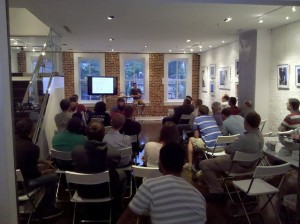I’m excited to announce I’m giving a keynote address at php[tek] 2013. It’s a fantastic PHP conference put on by the folks behind php|architect. “The premier professional PHP conference with a community flair,” #tek13 has a rockstar speaker line-up, four tracks of content, and a day of training. I’m thrilled to be attending the conference — I also attended #tek11 — let alone speaking.
Last night I tested a few ideas at the DC PHP meetup and got some great feedback from the attendees. Some early reviews:
https://twitter.com/wardnetinc/status/322140560523673601
https://twitter.com/kingkool68/status/322151835756544000
https://twitter.com/openwestconf/status/322393612249886720
I’m continuing to conduct a lot of research for this talk. There’s a lot WordPress has learned over the years, so I’ve been searching through the codebase and old commit messages, as well as compiling a ton of data and statistics. If you have anything you think might help, please contact me. Here’s the full talk description:
WordPress is Everywhere: Extreme Portability as a Double-Edged Sword
WordPress has tens of millions of users worldwide and powers over a fifth of new sites. But such a large and diverse user base presents unique challenges, and as it approaches its tenth birthday, the WordPress codebase is showing its age. So why is it so ubiquitous?
The answer lies not in its UI, UX, ecosystem, or community, though those are certainly among its strengths. The answer lies instead in a core philosophy that holds the user above all else.
This user-centric design starts not with the interface, but rather with the code itself. Developers should approach software development with an unwavering promise they will deal with the nonsense instead of passing it off to the user.
Some WordPress positions might seem draconian and inflexible. Backwards compatibility is almost never broken. The technical requirements appeal to lowest common denominators. But because the project maintainers deal with all the pain — technical debt, difficulties with PHP, working on as many server configurations (and misconfigurations) as possible — its users don’t have to. Thanks to the WordPress project’s portability efforts, you can pick a web host or a PHP configuration at random and WordPress will run on it. Because of this, adoption has soared.
The way WordPress operates is not for everyone. But whether your projects are used by 10 users, or 10 million, it may help you to see your code in an entirely new light.
Tickets are still available. Hope to see you there!

